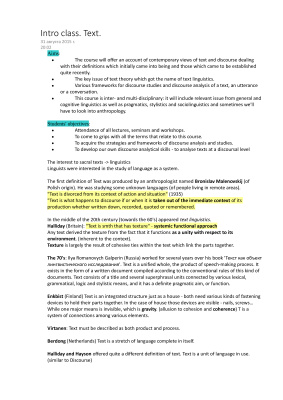М.: МГЛУ, 2015. — с.35 Данный курс представляет собой теоретический
обзор тем по следующим аспектам: "Анализ дискурса", "Теория
текста", "Когнитивная лингвистика". Теоретическая база курса
поможет студентам подготовиться к написанию анализов предлагаемых
преподавателем текстов и сдаче экзамена по данным аспектам.
Материалы лекций содержат тематику следующей направленности:
1. The notion of text.
2. Standards of textuality.
3. The standard of cohesion.
4. The standard of coherence.
5. Intertextuality.
6. Modality.
7. Intentionality.
8. The concept of discourse.
9. The notion of Discourse Analysis. (linguistic, semiotic, social, sociological) Discourse analysis is recontextualization of social dimensions - social domain, social practice, social event
10. Discourse and Society.
11. Discourse and Social dimensions.
12. Discourse and Gender.
13. Discourse and Identity.
14. Discourse and Pragmatics.
15. The concept of genre.
16. The concept of context.
17. Speech acts and discourse.
18. Face threatening speech acts.
19. The cooperative principle by Grice
20. Implicature and Discourse.
21. Theory of relevance.
22. Decoding and Inference.
23. Types of Discourse. (narrative, description, exposition, argumentation)
24. Spoken and Written Discourse.
25. A continuum of differences between spoken and written discourse.
26. Political discourse.
27. Professional and Institutional Discourse.
28. Discourse and Conversation.
29. The social and cultural idea of genre.
30. Sequence and Structure in conversation. (+adjacency)
31. Literary discourse.
32. Literary and non-literary discourse. (lexical density)
33. Multimodal discourse.
34. The principles of meaning constructions of Discourse.
35. Iconicity as a principle of meaning construction in Discourse.
36. Conceptual metaphor as a principle of meaning construction. (+integration)
37. Conceptual metonymy as a principle of meaning construction.
38. Word meaning.
39. Utterance or sentence meaning.
1. The notion of text.
2. Standards of textuality.
3. The standard of cohesion.
4. The standard of coherence.
5. Intertextuality.
6. Modality.
7. Intentionality.
8. The concept of discourse.
9. The notion of Discourse Analysis. (linguistic, semiotic, social, sociological) Discourse analysis is recontextualization of social dimensions - social domain, social practice, social event
10. Discourse and Society.
11. Discourse and Social dimensions.
12. Discourse and Gender.
13. Discourse and Identity.
14. Discourse and Pragmatics.
15. The concept of genre.
16. The concept of context.
17. Speech acts and discourse.
18. Face threatening speech acts.
19. The cooperative principle by Grice
20. Implicature and Discourse.
21. Theory of relevance.
22. Decoding and Inference.
23. Types of Discourse. (narrative, description, exposition, argumentation)
24. Spoken and Written Discourse.
25. A continuum of differences between spoken and written discourse.
26. Political discourse.
27. Professional and Institutional Discourse.
28. Discourse and Conversation.
29. The social and cultural idea of genre.
30. Sequence and Structure in conversation. (+adjacency)
31. Literary discourse.
32. Literary and non-literary discourse. (lexical density)
33. Multimodal discourse.
34. The principles of meaning constructions of Discourse.
35. Iconicity as a principle of meaning construction in Discourse.
36. Conceptual metaphor as a principle of meaning construction. (+integration)
37. Conceptual metonymy as a principle of meaning construction.
38. Word meaning.
39. Utterance or sentence meaning.

